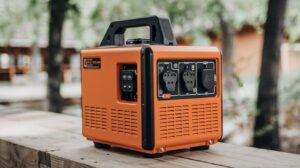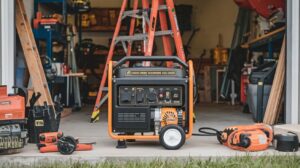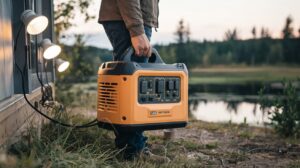In today’s world, almost everything hinges upon electricity. From office to home, a seamless power supply has become an integral part of our daily life. In a time like this where even the most basic tasks depend on electricity, a portable Generator can be the life-saver. Whether it’s a sudden blackout or a trip into the unknown, a portable generator empowers you with power when you need it the most.
What is a Portable Generator?
A Portable Generator is a compact, mobile tool that uses a fuel-powered engine to generate electricity. Suitable for temporary power requirements, these generators provide solutions when the access to the main power grid is unavailable. These mini generators are known for their compact size which ensures easy transportation, making them an ideal solution during power outages, outdoor events, or in remote locations where power supply is inadequate.
In this blog, we will explore everything about portable generators, including their benefits, features, and uses. Whether it’s a housing unit or small-scale business, this guide will tell you everything about portable generators, helping you navigate through the intricacies of power challenges.
What are the benefits of Portable Generators?
- Compact Size: Portable generators are becoming the first choice of people for tackling their small scale, temporary power needs. Thanks to their compact size, these generators are lightweight and mobile, allowing people to carry them anywhere, anytime.
- Adaptable: Unlike large generators that require significant space, portable generators are adaptable, effortlessly fitting into small spaces.
- Easy storage and maintenance: Portable generators come handy during outdoor projects and events like weddings and festivals, providing a dependable energy supply which allows you to enjoy your day to the fullest, without having to worry about power outbreaks.
- Cost–effective: Portable generators are cost-effective, making them highly suitable for residential spaces and small-scale businesses that search for efficient power solutions in alignment to their budget capacity.

What are the different types of fuels used in portable generators?
There are a variety of fuels that are used to operate a portable generator. These fuels vary from gasoline and propane to diesel and solar, and can easily be found in markets. The efficiency and performance of every portable generator differs from each other, depending upon the type of fuel used to run it.
- Gas powered portable generators: These portable generators provide high-power output, making them suitable for heavy duty tasks, like running appliances or tools. They are fuel-efficient, however, the efficiency can differ depending upon size and load. Gas powered portable generators typically require regular fueling.
- Diesel powered portable generators: Diesel powered portable generators are best for durability, offering reliable power supply for long hours. They are more fuel-efficient in comparison to gas generators, making them ideal for heavy loads.
- Inverter generators: These generators generally run on fuels like gasoline, propane and diesel, producing clean and stable power that is ideal for sensitive electronics like phones, laptops and computers. Thanks to their speed adjustment quality, these generators are highly fuel efficient.
- Solar powered portable generators: Solar powered generators are suitable for handling light loads, making them perfect for low power usage like powering lights, charging phones and small devices. These generators are completely silent and known for their environmentally friendly, cost-efficient qualities.
- Dual-fuel portable generators: The last in line, we have Dual-fuel portable generators. These generators utilize two types of fuel to operate- gasoline and propane. Due to their dual-fuel capacity, these portable generators can easily switch between gas and propane, providing flexibility depending on availability or cost of fuel.

What are the key features that you should look for in a portable generator?
When buying or renting a portable generator, you should pay extensive attention to its power output, fuel efficiency and noise level while focusing on its safety features at the same time.
- Power Output: The power range of portable generators generally varies depending on their sizes and intended use. A small portable generator usually produces power output somewhere between 1,000 to 2,000 watts while medium and large generators deliver 3,000 to 6,500, and 7,000 to 12,000 watts respectively.
- Noise Level: The noise levels of different portable generators are different. Gas and diesel fueled compact generators are louder as compared to inverter generators as they are designed with sound dampening features. Dual-fuel generators are similar to gas generators in their noise levels. However, Solar powered portable generators are an exception. Free of any moving components, solar generators are completely noiseless.
With the advent of state-of-the-art technology, new models are being designed with sound attenuation technology to get rid of the continuous noise, enhancing their power capacity while ensuring an undisturbed environment.
What are the uses of Portable Generators?
From camping and outdoor adventures to emergency backups and remote worksites, portable generators are highly preferred due to their compact size and mobility. These generators allow users to access efficient and reliable energy anywhere, anytime, saving their day in case of emergency. If you’re going on a trip into the wilderness or hosting a party in the open, make sure a powerful portable generator is the first thing you choose.

What are the tips you must keep in mind while maintaining a portable generator?
Now, as we are done with features and benefits, let’s talk about some beneficial maintenance tips that you must remember to keep your generator in good condition.
- Change oil regularly: Change the oil of your generator after the first 20-30 hours of use or as recommended by the manufacturer, followed by the maintenance schedule to ensure smooth operation.
- Store in a Dry, Cool Place: Store your portable generator in a dry and cool place as it slow downs the fuel-evaporation process. A cool and dry place also prevents your generator from heat damage and corrosion, expanding its longevity.
- Clear the Air filters: Regularly check and clean the air filters to prevent it from clogging by debris and dirt. Make sure to change it if it is dilapidated or extremely dirty.
- Check Fuel Quality: Use fresh and clean fuel. Avoid using contaminated and old gasoline. For long-term storage, either drain the tank or use a fuel stabilizer to prevent gum buildup.

When looking for a reliable power supply that can empower you in time of need, there is no better choice than a portable generator. They are compact, mobile and efficient—an ideal partner which can provide you consistent power supply for your temporary needs. Apart from their easy handling, portable generators are also cost-effective, ensuring to elevate the fun of your event without breaking your budget.
Take your time to explore all the options available in the market to ensure you will invest in a generator that is reliable and efficient, fitting best to your specific needs.
Ready to find the perfect portable generator? Check out our list of top-rated models for every need.
